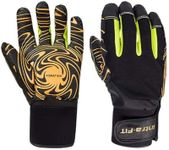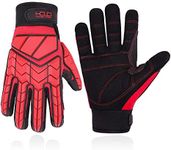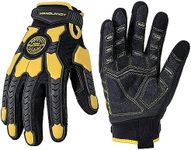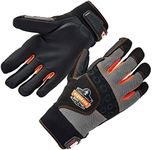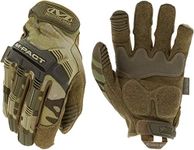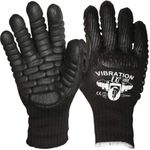Buying Guide for the Best Anti Vibration Gloves
When it comes to choosing the right anti-vibration gloves, it's important to understand that these gloves are designed to reduce the impact of vibrations on your hands and arms. This is particularly useful for people who work with power tools or machinery that generate a lot of vibrations. The right pair of gloves can help prevent conditions like Hand-Arm Vibration Syndrome (HAVS) and improve overall comfort and safety. To make an informed decision, you should consider several key specifications that will help you find the best fit for your needs.Vibration ReductionVibration reduction is the primary function of anti-vibration gloves. This spec indicates how well the gloves can absorb and dampen vibrations. The effectiveness can vary, with some gloves offering higher levels of reduction than others. If you work with high-vibration tools like jackhammers or chainsaws, look for gloves with maximum vibration reduction. For lighter tasks, moderate reduction may suffice. Your choice should be guided by the intensity and duration of the vibrations you are exposed to.
MaterialThe material of the gloves affects both comfort and durability. Common materials include leather, synthetic fabrics, and gel padding. Leather is durable and provides good protection, but it can be less flexible. Synthetic fabrics are often more flexible and breathable, making them comfortable for extended use. Gel padding is excellent for absorbing vibrations but can make the gloves bulkier. Consider the type of work you do and how long you will be wearing the gloves to choose the right material.
Fit and ComfortA good fit is crucial for both comfort and effectiveness. Gloves that are too tight can restrict movement and cause discomfort, while gloves that are too loose may not provide adequate protection. Look for gloves that offer a snug but comfortable fit, with adjustable features like Velcro straps to ensure they stay in place. Trying on different sizes and styles can help you find the best fit for your hands.
DexterityDexterity refers to how easily you can move your fingers and perform tasks while wearing the gloves. High dexterity is important for tasks that require precision, such as operating small tools or handling delicate materials. Gloves with more padding may reduce dexterity, so if your work requires fine motor skills, look for gloves that balance vibration reduction with flexibility.
DurabilityDurability is important because it determines how long the gloves will last under regular use. Consider the type of work you do and how often you will be using the gloves. If you work in harsh conditions or use heavy machinery, look for gloves made from durable materials like reinforced leather or high-quality synthetic fabrics. Checking user reviews and manufacturer warranties can also give you an idea of the gloves' longevity.
GripA good grip is essential for safely handling tools and materials. Anti-vibration gloves often feature textured palms or additional grip materials to help you maintain control. If you work in wet or oily conditions, look for gloves with enhanced grip features to prevent slipping. The right grip can improve safety and efficiency in your work.


